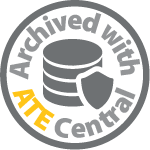Archiving Service
 Many ATE projects and centers create digital materials – curriculum, reports, videos, recruitment and outreach materials, and other valuable content. ATE Central provides an archiving service to help sustain and expand the impact of those materials beyond the life of the originating grant.
Many ATE projects and centers create digital materials – curriculum, reports, videos, recruitment and outreach materials, and other valuable content. ATE Central provides an archiving service to help sustain and expand the impact of those materials beyond the life of the originating grant.
If you have an ATE-funded project or center, you are required by NSF (as outlined in the ATE program solicitation (RFP)) to archive all ATE-funded digital deliverables with ATE Central, to help ensure their continued availability beyond your grant period.
The Archiving Service is not intended to supplant your own outreach and dissemination efforts. ATE Central will not make your archived materials publicly available as long as you are distributing them (unless you want us to). The goal of the Archiving Service is to expand and extend the impact of your work, beyond the grant period.
See All Currently-Archived Resources
Requirements
File Formats
Archived files must be in one of the formats listed below, and fit within the specified maximum file sizes.
Content designed specifically for use in an LMS should be packaged in the IMS Common Cartridge format. (Most modern LMSes support exporting content in IMS CC format; check with your LMS administrator for details.)
| Formats | Max File Size | Notes | |
| Text | .rtf, .pdf (preferred) .docx, .xlsx, .pptx (allowed) |
250MB | |
| Images | .png, .jpg (preferred) .gif, .bmp (allowed) |
1GB | |
| Video | .mkv, .mp4 (preferred) .avi (allowed) |
1GB | videos must play on VLC Media Player |
| Audio | .flac, .mp3 (preferred) .alac, .aac, .ogg (allowed) |
250MB | no copy-protected audio allowed |
| LMS | .imscc |
ATE Central’s digital preservation efforts are informed by the Open Archival Information System (OAIS) Reference Model standard and will evolve to reflect newer archival standards as they emerge.
Intellectual Property Rights
To allow legal archiving and distribution, all content must have clear intellectual property rights. This means you must have explicit permission to distribute all of the content included in any deliverables you create, for it to be preserved and distributed by the Archiving Service.
A good way to facilitate archiving and help ensure the widest use and impact for your work is to use a Creative Commons license. NSF explicitly recommends in the ATE RFP that any work created with ATE funding be licensed under a Creative Commons Attribution (CC BY), Attribution-ShareAlike (CC BY-SA), or Attribution-NonCommercial-ShareAlike (CC BY-NC-SA) license.
All materials submitted for archiving must be accompanied by a clear intellectual property statement or license.
What to Archive
Any and all digital deliverables that are created with ATE funding and may be of lasting use to technician educators, students, or other stakeholders should be archived. This includes instructional, assessment, reference, and professional development materials, as well as research reports, best practices, manuals and guides, and data collection instruments such as surveys.
ATE project and center PIs may request restricted access to materials, when appropriate. For example, access to fee-based curriculum may be restricted so as not to negatively impact the interests of the project or center that created it.
Internal reports or data sets that document the success of the project or center may also be archived, and will not be made public, but rather held for future research purposes or the use of NSF. As with publicly-distributed materials, participant data in internal reports or data sets must be aggregated or otherwise altered before archiving, to protect individual participant information.
Submitting Materials
When submitting materials for archiving, please:
- Double check that all resources fit the file format and size requirements listed above, and
- Make sure you include explicit intellectual property information (statement or license).
Uniform file and folder naming is also appreciated.
Individual Resources
Individual resources can be uploaded directly via the Archiving Submission Form.
Collections of Related Resources
For collection of related resources (multiple lesson plans, workshop handouts, a video series, etc), compress them into a single ZIP file, and upload that file via the Archiving Submission Form. The ZIP file should contain one copy of each of the resources, and the use of sub-folders to organize the materials is encouraged.
If you’re unsure how to compress a folder into a ZIP or need additional assistance in preparing your files for transfer, please do not hesitate to contact us – we are happy to help.
Full Academic Courses
To submit an entire academic course, please make sure it includes the elements listed below, compress it all into a single ZIP file, and the upload the ZIP file via the Archiving Submission Form.
Required for courses:
- Course syllabus,
- Audio, video, image, and text resource placed in subfolders,
- Screenshot of LMS course main page (if available), and
- IMS Common Cartridge file for course from LMS (if available).
ATE Central staff is committed to helping you successfully archive your resources with ease. If you have any questions, comments, or concerns please do not hesitate to email us.
Additional Resources
Archiving Planning Worksheet (Word version)
Archiving Sample Spreadsheet (Word version)